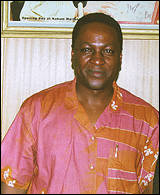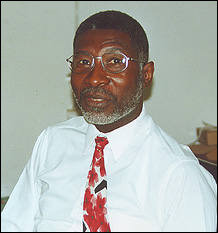 Striding
Telecommunications Striding
Telecommunications
Arguably Ghana’s service sector has been the most diversified in the economy and has a considerable growth potential. Private entrepreneurs say the gradual withdrawal of the government from the provision of some of the essential services, through privatization and the reforms in the financial sector, are having a tonic effect as investors take on an increasing share in the operation of banks in the country.
The sector plays a vital role in the economy by facilitating economic growth while providing an enabling environment for the productive sector to function more effectively. The government has already privatized telecommunications, the state transport and divested its shares in a number of banks.
Indeed, Ghana is making strenuous efforts at growth in the telecommunications sector. Presently, there are two major operators in the sector; Ghana Telecom and Westel. Ghana Telecom which used to be the sole provider of telecommunications services in the country was privatized by the government who sold 30 per cent of its shares to a consortium of strategic investors led by Telecom Malaysia for 38 million dollars.
With the liberalization of the telecommunication sector, Westel was licensed as the first private operator owned by ACG Tele-systems. This joint venture initiative was struck between the Western Wireless Corporation of Washington, USA, and the Ghana National Petroleum Corporation (GNPC).
Ghana Telecom has launched an expansion program to deliver 25,000 direct lines in 300 pay phones between February 1997 and February 1998. Records indicate that this target has been exceeded. In fact, the company delivered 27,600 lines and installed more than 1,000 pay phones. There is every indication that the company can live up to its projected 50,000 lines by the year 2000.

The Communications Minister, John Mahama , says that the vision for the next 10 years is to ensure that every community that can show a potential telephone-user demand of 500 people should get a telephone. This vision should not be difficult for the operators since Ghana Telecom for instance has a nationwide network. It is already taking advantage of its position by venturing into mobile phone operation and embarking on a pilot project which some see as going to pose a stiff challenge to the three existing mobile phone operators.
The three mobile phone operators, Mobitel, Spacefon and Celltel are all based in the capital, Accra, and are laboring to expand nationwide. They argue that expanding nationwide will be expensive and wish to enter into agreement with Ghana Telecom who already has the structure. There is no deliberate government policy to help the operators to expand, but John Mahama says the government will encourage collaboration among all the operators and Ghana Telecom.
But there is fierce competition between them as well. Mobitel owned by Millicom Limited, a British Firm, who first brought analog mobile phones into the country in 1993 has recently introduced a prepaid card and was followed by Spacefon which is owned by Scancom, the authorized GSM system operators in Ghana.
Celltel , the smallest of the three in terms of area coverage began operation in 1996 and covers two urban areas, Accra and Tema, while its competitors Mobitel and Spacefon are operating in seven regional capitals. The chairman of Celltel, Prince Kofi Kludjeson , says that it has not been easy expanding. "Today, we are covering Accra and Tema but by the end of the year, we should be covering 50 per cent of the country. We are building about 120 cell sites in the country having begun with only three".
| There is great potential for mobile phone operations in Ghana because the three major operators are presently concentrating their operations in the capital Accra, and are yet to explore the rural areas where about 70 per cent of the total population of Ghana lives. These operators however, are eager to introduce several services for the customer to chose from.
Mr. Ahmed Farrouk , Managing Director of Spacefon said the company has introduced a lot of high-tech systems including group calling, SMS service, mobile internet on their equipment which is supplied by Ericsson. Since it begun its operations three years ago, Spacefon has registered 27,000 subscribers and has over 50 per cent share of the industry.
On his part, Mr. Kludjeson explains that today, Celltel has ten thousand subscribers but "we are projecting to have about one hundred thousand and also to bring prices down." "Today, Mobitel, Spacefon and others are around forty-fifty cents per minute which is too expensive for the market. This means that the numbers are not going up. We are trying to lower the prices by about ten to twenty cents. This way, we target young executives and rural areas", Mr. Kludjeson said.
Perhaps one area that the telecommunications industry had not been able to exploit fully is the internet. Communication Minister John Mahama said that the National Telecommunication Authority (NCA) has issued internet service provider licenses to two major telecommunication companies, Ghana Telecom and Westel. "But, of course, we have licensed a lot of private operators too. What we are trying to do is to let the consumer get the best from the competition that will take place," he added.

The licensing of Ghana Telecom and Westel brings to four the major internet service providers in the country at the moment even though there are a few smaller ones trying to come up. The other two are the Network Computer Systems (NCS) and Africa Online. "There is competition between the operators and these two that we have licensed are coming to join the private operators. We are trying to give the people of Ghana a choice in quality both in internet and telecommunication service," he emphasized.
In the telecommunication industry in West Africa, Minister Mahama believes that Ghana has the infrastructure to support expansion into the vast sub-regional market. He says "Ghana is a safe country, a country that is good to do business in and I will encourage any one with money to invest to look at Ghana as a positive staging point to hit the African market".
In spite of the low connectivity rate, Dr Nii Narku Quaynor , Executive Chairman of Network Computer Systems, a pioneer major private internet service provider in the country, says "Ghana was among the first to get internet service in Africa.". NCS is one of the major companies that is helping the government and industry in efforts to address the millennium bug - the Y2K problem. |

